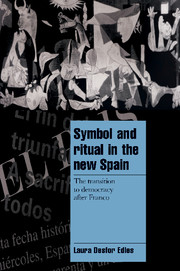Book contents
- Frontmatter
- Contents
- List of tables
- List of figures
- List of abbreviations
- Acknowledgements
- Map of Spain
- Part I Interpreting the Spanish transition to democracy
- 1 Introduction
- 2 Theories of transition and transitions in theory
- 3 Spain: a history of divisions and democracy
- Part II The symbolic basis of Spanish consensus
- Part III Conflict and consensus in the institutionalization of Spanish democracy
- Notes
- References
- Index
1 - Introduction
Published online by Cambridge University Press: 06 July 2010
- Frontmatter
- Contents
- List of tables
- List of figures
- List of abbreviations
- Acknowledgements
- Map of Spain
- Part I Interpreting the Spanish transition to democracy
- 1 Introduction
- 2 Theories of transition and transitions in theory
- 3 Spain: a history of divisions and democracy
- Part II The symbolic basis of Spanish consensus
- Part III Conflict and consensus in the institutionalization of Spanish democracy
- Notes
- References
- Index
Summary
In his recent book, In Retrospect: the Tragedy and Lessons of Vietnam, Robert McNamara suggests that the problem with Vietnam was that we did not understand Vietnam; no one making decisions was conversant with Vietnamese culture; United States' leaders ethnocentrically assumed that Vietnamese values were the same as ours. McNamara says he wrote his book so that we can “learn” from his (and our) mistakes. What he hopes we learn is that we should never enter into war without really knowing the country we seek to help, or are fighting against. An “expert” in that country should advise, and be in on the decision.
Interestingly, McNamara also said he could not have “known” this lesson at the time of Vietnam. He said it took him twenty years to write the book because the lesson was so long in coming.
From a culturalist perspective, McNamara's book is intriguing for several reasons. First, McNamara acknowledged something that cultural sociologists and anthropologists take as a given, but that most people tend to forget: that strategic decisions are made in a cultural – as well as historical, political, and economic – context; and that in order to understand your own or others' “strategic” interests one must understand the culture of which they are a part. Moreover, in arguing that he “could not have known then” what he knows now, McNamara implicitly admits to his own cultural immersion – as well as to the United States' infamous and long-standing cultural myopia.
- Type
- Chapter
- Information
- Symbol and Ritual in the New SpainThe Transition to Democracy after Franco, pp. 3 - 10Publisher: Cambridge University PressPrint publication year: 1998

